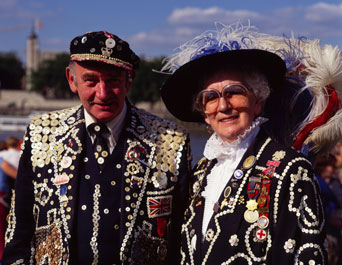3.2.1 Cockney rhyming slang
A key social function of the language of a group is that it serves to include some and exclude others. In some cases this constitutes a form of language code which is consciously used so that outsiders do not understand. A famous example of this is Cockney rhyming slang from the East End of London. A Cockney is someone ‘born within the sound of Bow Bells’ – that is, within earshot of the bells of the church of St Mary-le-Bow, Cheapside – but the term ‘Cockney’ is often used more broadly to describe working-class Londoners and their speech.
Rhyming slang probably originated in the first half of the nineteenth century. It works by substituting the word that is meant (e.g. ‘look’) with a common phrase that rhymes with it (e.g. ‘butcher’s hook’). The rhyming word in the new phrase is then omitted (e.g. the word ‘hook’, so ‘look’ becomes ‘butcher’s’: ‘Have a butcher’s at this!’). So, to take another example, if you want to say ‘tie’ in rhyming slang it would be ‘Peckham’ (the full phrase would be ‘Peckham Rye’ – referring to another area of London – with the ‘Rye’ omitted.). It is worth noting here that this only makes sense if you know the geography of the local area.

Activity 17
Below is some Cockney rhyming slang. See if you can guess the missing elements and type them into the spaces below. The first two have been done for you.
1. Hampstead (Heath) = teeth
2. apples (and pears) = stairs
3. trouble (____ ____) = wife
Answer
trouble (and strife) = wife
4. loaf (____ ____) = head
Answer
loaf (of bread) = head
5. rabbit (____ ____) = talk
Answer
rabbit (and pork) = talk
6. porky (____) = lie
Answer
porky (pie) = lie
7. plates (____ ____) = feet
Answer
plates (of meat) = feet
8. dog (____ ____) = phone
Answer
dog (and bone) = phone
Cockney rhyming slang has spread beyond its geographical origins. It is always evolving and often incorporates contemporary cultural allusions. To take just one example, a lower second-class university degree (2:2) can be referred to as a ‘Desmond’, after the famous South African cleric, Desmond Tutu. Speakers are free to make up their own and often do.
